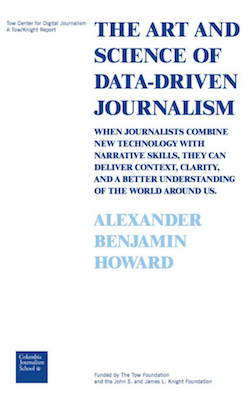 In order to consider the future of data journalism, you have to start by looking at the past. Alex Howard, a fellow at The Tow Center for Digital Journalism at Columbia Journalism School, has a new report out, “The Art and Science of Data-Driven Journalism,” that examines the current state of data journalism. The report is based on a series of interviews with current journalists, editors, academics, and more, from places like ProPublica, The New York Times, The Seattle Times, La Nación, and NPR, among others.
In order to consider the future of data journalism, you have to start by looking at the past. Alex Howard, a fellow at The Tow Center for Digital Journalism at Columbia Journalism School, has a new report out, “The Art and Science of Data-Driven Journalism,” that examines the current state of data journalism. The report is based on a series of interviews with current journalists, editors, academics, and more, from places like ProPublica, The New York Times, The Seattle Times, La Nación, and NPR, among others.
Howard’s report was released as part of The Tow Center conference, “Quantifying Journalism: Data, Metics, and Computation,” last week that featured discussion and fresh research looking at areas like the use of user-generated content in TV and online news and a look at the progress of using sensors in journalism, among others. (There’s video if you want to relive the whole conference.)
From (former Nieman Fellow) Philip Meyer using his “Precision Journalism” techniques up to ProPublica’s “The Prescribers” investigation, Howard’s report looks at how the availability of public records has changed, how the use of computers in newsrooms has become mainstream, and how data has changed the methods of storytelling from investigative series to news apps.
The report also looks at the obstacles to the growth of the field, including data literacy, newsroom culture, and the pipeline of new talent. Here’s Aron Pilhofer, soon to be executive editor for digital at The Guardian, on the need to change the culture around numbers and data in newsrooms:
Journalism programs need to step up and understand that we live in a data-rich society, and math skills and basic data analysis skills are highly relevant to journalism. The 400+ journalists at NICAR still represent something of an outlier in the industry, and that has to change if journalism is going to remain relevant in an information-based culture. Journalism is one of the few
professions that not only tolerates general innumeracy, but celebrates it.I still hear journalists who are proud of it, even celebrating that they can’t do math, even though programming is about logic. It’s hard to get a journalist to open up a spreadsheet, much less open up a command line. It is just not something that they, in general, think is held to be an important skill.
And ProPublica assistant managing editor Scott Klein on refocusing newsroom priorities on data journalism:
News organizations are contracting and budgets are going down. Times are still very tough. That said, I suspect that some newsrooms say they can’t afford to hire newsroom developers when they really mean that their budget priorities lie elsewhere – priorities that are set by a senior leadership whose definition of journalism is pretty traditional and often excludes digital-native forms. I also hear a lot from people trying to get data teams started in their own newsrooms that the advice that newsroom leaders get is that newsroom developers are “unicorns” whom they can’t afford. Big IT departments sometimes play a confounding role here.
The full report is available here. Many of the interviews Howard conducted over the year were published on the Tow Center blog, but all are collected here, with people like Pilhofer, Klein, Tasneem Raja of Mother Jones, Jeremy Bowers of the Times, and Cheryl Phillips of The Seattle Times, among others.
Howard concludes the report with 14 recommendations, calling for more transparency on how data is collected and used in journalism, anticipating an explosion in news apps as a way of producing information, and ways newsrooms can address security around their data and reporting. He writes:
While the potential of data journalism is immense, the pitfalls and challenges to its adoption throughout the media are similarly significant, from digital literacy to competition for scarce resources in newsrooms. Global threats to press freedom, digital security, and limited access to data create difficult working conditions for journalists in many countries. A combination of peer-to-peer learning, mentorship, online training, open data initiatives, and new programs at journalism schools rising to the challenge, however, offer reasons to be optimistic about more journalists learning to treat data as a source.